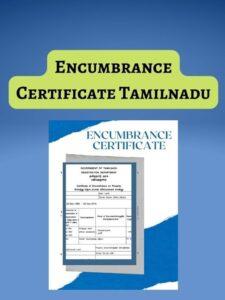Introduction
In the process of buying or selling property, one crucial document that plays a vital role is the Encumbrance Certificate (EC). The Encumbrance Certificate serves as evidence of the property’s title, indicating whether the property is free from any legal liabilities, such as mortgages, liens, or pending litigation. In Tamil Nadu, obtaining an EC is an essential step in any real estate transaction. This blog aims to provide a comprehensive guide on how and
where to obtain an Encumbrance Certificate in Tamil Nadu.

1. What is an Encumbrance Certificate
An Encumbrance Certificate is an official document issued by the Registration Department of the Government of Tamil Nadu. It contains all the registered transactions related to a specific property within a defined period. These transactions include mortgages, charges, leases, and any other financial liabilities on the property. The EC helps verify the property’s marketability, ensuring that there are no outstanding dues or disputes related to the property.
2. Purpose of an Encumbrance Certificate
a. Property Purchase: Before purchasing a property, it is crucial to verify its title and ownership history. An EC provides a clear picture of the property’s legal status and any encumbrances, thus safeguarding the buyer’s interests.
b. Loan Applications: Financial institutions often require an Encumbrance Certificate as a prerequisite for granting loans against property. It assures the lender that the property is free from any legal issues, reducing the risk associated with the loan.
c. Legal Disputes: In the case of legal disputes, an EC acts as substantial evidence to establish the ownership history and previous transactions on the property.
3. Period Covered by an Encumbrance Certificate
An EC in Tamil Nadu typically covers transactions for the past 30 years. However, it’s essential to check with the concerned Sub-Registrar’s Office as some offices might have data available for a shorter duration.
4. How to Obtain an Encumbrance Certificate in Tamil Nadu
There are two primary methods to acquire an Encumbrance Certificate in Tamil Nadu
a. Offline Method
Step 1: Visit the Sub-Registrar’s Office: To get the EC offline, the applicant must visit the concerned Sub-Registrar’s Office where the property is registered.
Step 2: Submit Application: Obtain the application form for an EC from the office counter, fill it accurately, and submit it along with required documents, such as property details, proof of ownership, and any other documents as specified by the office.
Step 3: Pay the Fee: Pay the prescribed fee for obtaining the EC. The fee structure may vary depending on the period for which the certificate is required.
Step 4: Verification and Processing: The office will verify the application and process the request. The processing time may vary, but applicants can generally collect the EC within 15 to 30 days.

b. Online Method
Step 1: Visit the TNREGINET website: The Government of Tamil Nadu has introduced an online platform called “TNREGINET” – https://tnreginet.gov.in/ (Tamil Nadu Registration Department) to facilitate various property-related services, including the issuance of Encumbrance Certificates.
Step 2: Registration and Login: Register on the TNREGINET portal and create a user account. After logging in, select the “Encumbrance Certificate” option from the menu.
Step 3: Fill in the Property Details: Enter the required property details, such as district, zone, sub-zone, and property registration details.
Step 4: Make Online Payment: Pay the prescribed fee online through net banking, credit card, or debit card.
Step 5: Receive the EC: After successful payment, the Encumbrance Certificate will be generated online. Applicants can download and print the EC from the portal itself.

5. Documents Required for Obtaining an Encumbrance Certificate
To apply for an Encumbrance Certificate in Tamil Nadu, the following documents are
generally required
a. Proof of Ownership: Sale Deed, Gift Deed, Will, or any other relevant document establishing the current ownership of the property.
b. Property Details: Accurate details of the property, including the survey number, plot number, and boundaries.
c. Identity Proof: Aadhaar Card, Passport, Voter ID, or any other valid government-issued identification.
d. Fee Payment Receipt: Proof of payment of the required fee for obtaining the EC.
6. Points to Remember
a. Timely Application: It is advisable to apply for an Encumbrance Certificate well in advance to ensure a smooth property transaction process.
b. Verification: Thoroughly verify the details mentioned in the EC to avoid any discrepancies or errors.
c. Legal Assistance: In case of any doubts or complexities in understanding the EC, seek legal advice or consult a property expert.
Conclusion
Obtaining an Encumbrance Certificate is a crucial step in any property transaction, as it ensures the property’s authenticity and legal ownership status. In Tamil Nadu, the process has been streamlined with the introduction of online services, making it more accessible and convenient for applicants. Whether you choose the offline or online method, obtaining an EC will help you make informed decisions while buying or selling property. Always remember to verify the details mentioned in the EC and seek professional guidance if needed to have a seamless experience in acquiring this essential document.

1. What is an Encumbrance Certificate (EC), and why is it important?
Answer: An Encumbrance Certificate (EC) is a crucial legal document that provides information about the history of a property’s ownership and any monetary or legal liabilities associated with it. It certifies that the property in question is free from any outstanding debts, mortgages, or legal encumbrances. When buying, selling, or applying for a loan against a property in Tamil Nadu, an EC is essential to ensure a clean title and secure transaction.
2. Where can I obtain an Encumbrance Certificate in Tamil Nadu?
Answer: In Tamil Nadu, you can obtain an Encumbrance Certificate from the Sub-Registrar’s Office (SRO) where the property is registered. The SRO is responsible for maintaining property records, and you can request an EC by submitting the necessary application form, providing property details, and paying the applicable fees.
3. What documents are required to apply for an Encumbrance Certificate in Tamil
Nadu?
Answer: To apply for an Encumbrance Certificate in Tamil Nadu, you typically need the following documents:
– Copy of the property’s sale deed or title deed.
– Proof of property identification, such as the survey number or address.
– Any additional documents requested by the Sub-Registrar’s Office, if applicable.
4. How long does it take to obtain an Encumbrance Certificate in Tamil Nadu?
Answer: The processing time for an Encumbrance Certificate in Tamil Nadu can vary depending on the complexity of the property’s history and the workload at the respective Sub-Registrar’s Office. In general, it may take anywhere from a few days to a couple of weeks to receive the certificate.
5. Is it possible to obtain an Encumbrance Certificate online in Tamil Nadu?
Answer: Yes, the Tamil Nadu government has introduced an online portal called “Tamil Nadu Registration Department” to facilitate the issuance of Encumbrance Certificates online. You can access the portal, submit the required property details, and pay the fees online to receive a digitally signed EC. However, it is worth noting that the online service may not cover properties registered before a specific date, so offline applications may be required for older properties.

